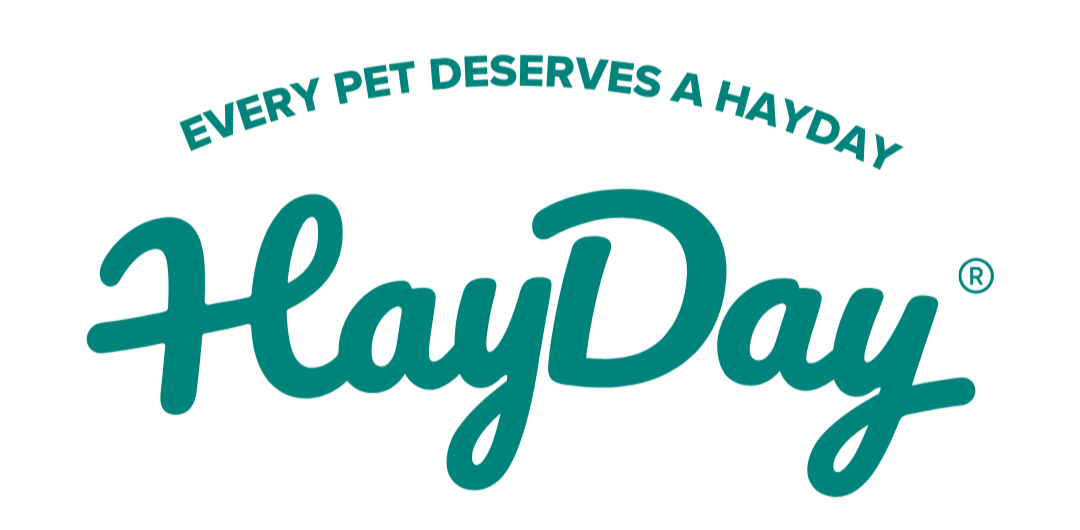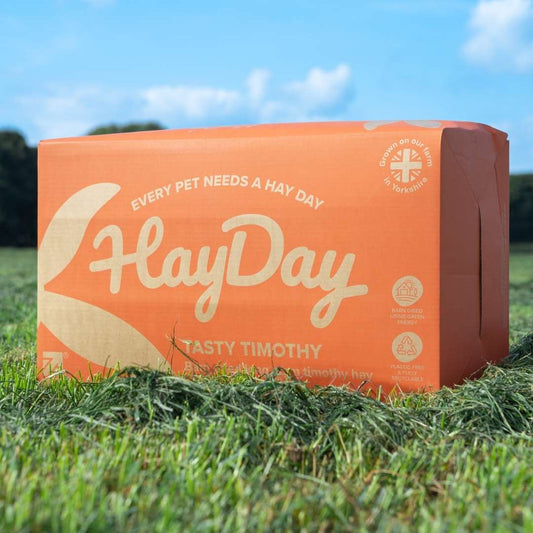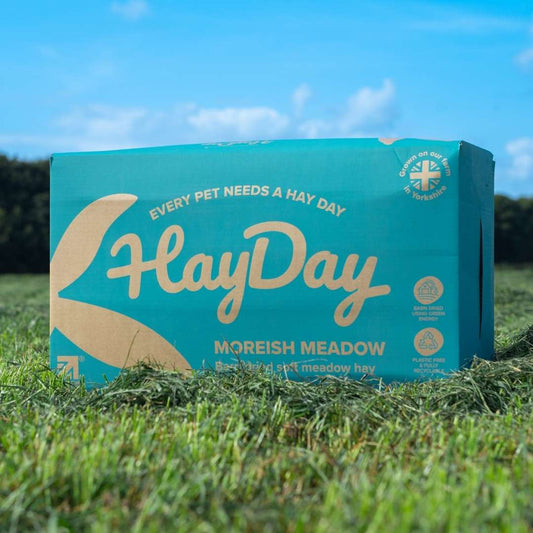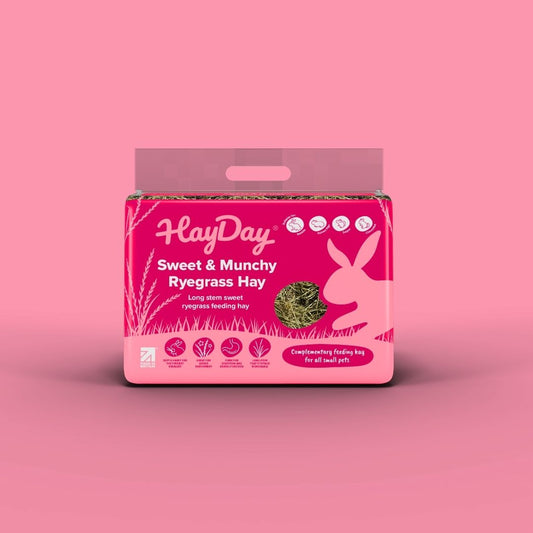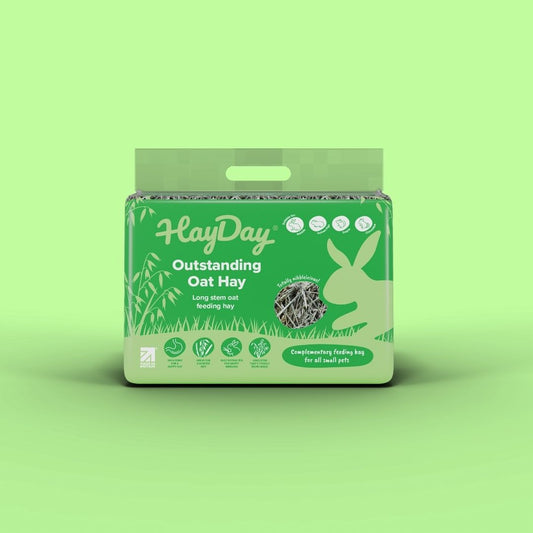If you’re wondering, “Can rabbits eat onion?” the answer is no. Onions can be toxic to rabbits and can cause serious, if not fatal, health issues.
Here at HayDay, we want you to have a happy bun not only with our high-quality, barn dried hay but also with some top tips and advice on nutrition.
Which is why, in this guide, we will explore the reasons why onions can be harmful to rabbits and what to do if your rabbit consumes them inadvertently.
Onions & Rabbits - Overview
-
Onions and all members of the onion family are toxic to most animals, including rabbits, and can lead to severe health issues and potentially fatal conditions.
-
If your rabbit eats onions, you must be vigilant and look for any signs of illness. We would recommend contacting an emergency vet if a rabbit ingests a large amount of onions to manage the toxicity.
-
Rabbits should be fed a diet rich in rabbit hay, rabbit safe pellets, leafy greens and the occasionally treat (such as fruits) whilst avoiding high-sugar, high-carb and fatty based foods to ensure their health and proper digestion.
The Dangers of Onions for Rabbits
Onions are an unsafe food for rabbits and therefore, are a no-go when it comes to rabbit food.
Every part of the onion plant, including the peels, skins, roots and leaves, can be harmful to both wild rabbits and domestic outdoor and indoor rabbits. Ingestion of onions can lead to severe health issues in rabbits, so should be avoided.
Can Rabbits Eat Spring Onions?
If you're wondering whether rabbits can eat spring onions, the answer is no. They are part of the onion family and contain harmful substances that can seriously upset your rabbit's health. It's best to keep them away from your rabbit entirely.
Can Rabbits Eat Red Onions?
When it comes to red onions, they are just as dangerous. Rabbits should never eat them because they contain toxins that can damage their digestive system and make them very ill. Making sure your rabbit doesn’t have any red onions is crucial for their safety and health.
Can Rabbits eat Leeks?
Leeks are also a no-go for rabbits. They belong to the same family as onions and contain harmful compounds. If a rabbit eats leeks, it could lead to serious health issues, and it’s best to avoid giving them to your pet completely. Keep leeks out of their diet to protect their wellbeing.
But why are onions dangerous to bunnies? To understand that, let’s have a little look into the toxic compounds found in onions.
Toxic Compounds in Onions
Onions contain thiosulphate and organosulfur compounds, both of which are toxic to rabbits.
The specific toxic compound thiosulphate present in onions is not well tolerated by rabbits’ digestive systems, leading to potential damage.
Signs Your Rabbit Has Consumed Onion
Observation is key, and recognising onion consumption in your bunny is of utmost importance.
The signs of onion ingestion in rabbits are: dizziness, weakness, difficulty in movement, rapid breathing, and lethargy.
More specific signs of onion ingestion in rabbits can include:
-
Ataxia (stumbling)
-
Collapse
-
Disinterest in food or water
If your rabbit exhibits any of these signs after potentially consuming onion, it’s essential to seek veterinary help immediately.
What to Do If Your Rabbit Eats Onion
When a rabbit ingests large amounts of onion, acting quickly is key to preventing serious health problems.
The initial and most critical response is to get immediate veterinary care. While waiting for veterinary care, observe the rabbit for signs of distress and encourage drinking water and eating greens.
Continue to monitor your rabbit closely for adverse reactions such as diarrhea, and seek immediate assistance if the rabbit appears unwell.
Keeping Your Rabbit Calm
In such a distressing situation, maintaining your rabbit’s calmness is vital. Providing continuous access to fresh, clean drinking water helps to keep rabbits calm and healthy.
It’s important to check the water supply at least twice a day to stave off dehydration-related illnesses and provide a serene environment for the rabbit.
Ensuring your bunny is comfortable can help reduce stress and potentially lessen the impact of any toxins.
Safe Foods for Rabbits
Now that we’ve discussed that you shouldn't feed your rabbit onion let’s go over the types of rabbit food that are safe. High-quality hay, leafy greens and other vegetables are a mainstay in a rabbit’s diet.
Fibre-Rich Diet
Remember, fibre is an essential component in a rabbit’s diet.
Hay is the most important factor in a rabbit’s diet, providing essential fibre, protein and other key nutrients that aid in digestion and dental health. Timothy Hay, Meadow Hay and Ryegrass Hay are recommended for adult rabbits, while Alfalfa Hay is suitable for younger rabbits in limited quantities.
A rabbit’s diet should primarily consist of:
-
An unlimited amount of premium quality hay (80-90% of their diet), offered at free choice, which is crucial for maintaining dental health and proper digestive function
-
Don't just provide one type of hay! Feeding a different variety of hay can help keep a rabbit’s will help to keep them enriched.
-
-
Approximately 10% of rabbit safe pellets
-
A handful (5-10% of their diet) of leafy greens and veggies
Safe fruits and vegetables
Safe choices include arugula, basil, bell peppers, bok choy, broccoli leaves, carrot tops, celery, collard greens, dandelion leaves, endive, kale (in moderation), romaine and other dark-leaf lettuces, mustard greens, parsley, watercress, green beans, squash, and zucchini.
Rabbits can also enjoy a variety of fruits as treats in moderation. These include strawberries, bananas, raspberries, pineapple, apples (without seeds), melons, and berries. You should only feed fruits occasionally as they are high in sugar content.
Other Foods to Avoid in a Rabbit's Diet
While we’ve already mentioned onions, there are other foods that rabbits should also avoid.
Rabbits should not consume avocados, chocolate, or mushrooms due to potentially harmful substances within.
Other inappropriate foods for rabbits include:
-
Meat, eggs, and dairy products due to their inability to handle animal proteins
-
Raw potatoes, rhubarb, fruit seeds/pits, iceberg lettuce
-
Processed foods such as bread, pasta, or cookies
Root vegetables should be limited in a rabbit’s diet, and foods high in fat or carbohydrates must be ideally avoided entirely.
Tips for Monitoring Your Rabbit's Eating Habits
Keeping track of your rabbit’s food intake is as vital as being aware of the safe foods. Keep a close eye on your rabbit’s diet due to their sensitive gastrointestinal systems, which can be easily disrupted by sudden dietary changes.
Continually check your rabbits poops as they can be a good indication about their overall health.
Feeding portions should be adjusted to prevent underweight or overweight conditions, which can negatively affect their health. Always consult your exotic vet when undertaking any dietary changes.
Introducing New Foods Slowly
Introduce new foods to your rabbit’s diet slowly to circumvent digestive problems. Here’s how:
-
Start with a small amount of the new food.
-
Incrementally increase the amount over a period of seven to fourteen days
-
This slow introduction allows the rabbit’s digestive system to adjust to the new food, reducing the risk of upset stomachs or more severe health issues.
If your rabbit shows signs of discomfort or illness after introducing a new food, stop them from eating it, and if you are really concerned, consult with a vet.
Maintaining a Clean and Safe Environment
Maintaining a clean and hazard-free environment is equally important for your rabbit’s health. Rabbits must always have access to fresh, clean water, which should be changed daily to prevent contamination.
Fresh hay is vital for rabbits’ health and should be given in the recommended portions daily to prevent spoilage and ensure that the rabbit is not eating spoiled food.
The rabbit’s living space must be kept clean and free from toxic plants and harmful substances to prevent any risks to their health and well-being.
Summary
In conclusion, understanding your rabbit’s dietary needs is crucial to their health and longevity. Avoid toxic foods like onions and ensure their diet is rich in fibre from high quality hay, pellets and leafy greens.
Introduce new foods slowly and always keep a clean and safe environment for them. Remember, a healthy rabbit is a happy rabbit!
Please contact the Animal Poison Line if you need to seek any further information.
Frequently Asked Questions
Can rabbits eat onions?
No, rabbits should not eat onions as they are considered poisonous to them.
What are the symptoms of a rabbit eating onion?
If your rabbit exhibits symptoms such as dizziness, weakness, difficulty getting up, fast breathing, and lethargy, seek medical treatment immediately.
What other foods can rabbits have?
Rabbits can have a variety of fruits and vegetables, including carrots, dark lettuces, bananas, berries, green beans, celery, and squash, among others. It's important to introduce new foods in small portions and over a period of 7 to 14 days to ensure they agree with your rabbit.
